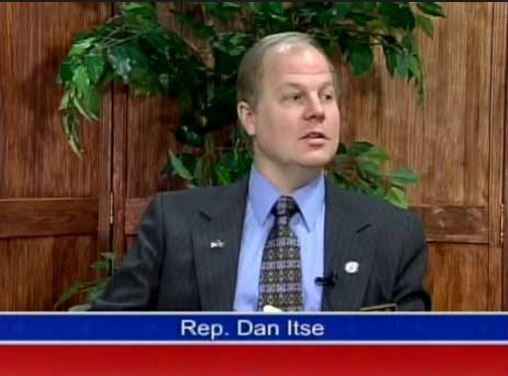State Rep. Dan Itse, R-Fremont, provides a column from a Republican perspective to what’s going on in the legislature each week for InDepthNH.org readers. An engineer, Itse has represented Rockingham County since 2001.
By Rep. Dan Itse, R-Fremont
View From Inside
This week was interesting to say the least. I arrived to the State House a little late to find the House of Representatives in the midst of a debate on investigating two representatives for their behavior.
The first Representative in question is Rep. Robert Fisher, a Republican from Laconia in his second term, though interestingly enough he originally ran as a Democrat. The second Representative is Rep. Sherry Frost, a freshman Democrat from Dover.
I will be honest, I am not familiar with the alleged offenses of either individual so I will not be mentioning any particulars. The measure began as a call to investigate Rep. Fisher for alleged sexist comments he made in the past, from what I can understand, well before being a member of the Legislature.
This was amended to include investigating Rep. Frost for alleged threats made against Republicans. I have no idea when the threats were made, nor against whom in particular. The inclusion of Rep. Frost was narrow 182 to 180. The whole measure passed by 307 to 56.
I’m bringing this up to discuss what actually may be done. The Constitution of the State of New Hampshire, The Form of Government (Part 2), Article 22 describes the internal powers of the House of Representatives. The House of Representatives, “shall be the judge of the returns, elections and qualifications of its members, as pointed out in this Constitution.”
The constitutional qualifications are as follows: 2 years inhabitancy in the State; being an inhabitant of the District to which they are elected; no one holding any of the following offices “judge of any court, (except special judges) secretary, treasurer of the state, attorney-general, register of deeds, sheriff, collectors of state and federal taxes, members of Congress or any person holding any office under the United States, including any person in active military service;” no one who has been convicted bribery or corruption in obtaining an election or appointment. There are no other qualifications or disqualifications for office.
In fact, there is no stated age limit for State Representative, but it has always been presumed to be that for voting. Neither Representative has to my knowledge been alleged to have committed an act that disqualifies them for their office.

Rep. Dan Itse, R-Fremont
The Constitution goes on in Article 22 to describe the power of the House of Representatives to hold individuals in contempt. Generally, it is for “disrespect of the House, in its presence, by disorderly and contemptuous behavior, or by threatening or ill treating, any of its members; or by obstructing its deliberations; every person guilty of a breach of its privileges, in making arrests for debt, or by assaulting any member during his attendance at any session; in assaulting or disturbing any one of its officers in the execution of any order or procedure of the House; in assaulting any witness, or other person, ordered to attend, by and during his attendance of the House; or in rescuing any person arrested by order of the House, knowing them to be such.”
The House has the power to imprison for contempt with no limitation on the term of imprisonment. The Senate, Governor and Executive Council all have independent powers of holding individuals in contempt, but only for a term of 10 days or less. The Judiciary has no constitutional power to hold individuals in contempt, though they have recently claimed an inherent power to hold to people in contempt. However, in a government where all power is derived from the people (Part 1, Articles 1 and 8) such a claim is akin to a claim of divine right.
Rep. Fisher’s behavior, as best I understand, occurred before he was a member, on social media. As contemptuous as I have heard his behavior to have been, it can’t be construed as happening in the presence of the House. Nor did it meet any of the other qualifications. Rep. Frost’s behavior, as best I understand, is one of making threats of violence against Republicans. However, unless those threats were made against members of the House either in general or particular, I don’t see a case for contempt of the House of Representatives. However, the House can always discipline its members with measures such as censure. Censure is a condemnation of the act with no physical or legal consequences.
The rest of the day was far more mundane. The controversial Bills were SB191, full-day kindergarten, and SB247 mandatory testing of children for lead poisoning.
Full-day kindergarten will fund towns with full-day kindergarten from the education trust fund. I understand that it will give more money to towns that already have full-day kindergarten than to those that currently have half-day kindergarten. It does not make full-day kindergarten mandatory, nor does it require provisions for those who do not want their children in full-day kindergarten.
More dubious in my book is that it transfers wealth from those who make the sacrifice of having a single-income family for the purpose of raising their own children to those who choose to have two incomes, and therefore, would require daycare. There is no evidence that full-time kindergarten (or early education) result in long-term academic benefits to the child. I voted against funding full-time daycare, I mean kindergarten.
SB247 was even more confusing. It requires that all children have their blood level of lead tested twice before entering school and prohibits their admission to public, or private, school without the tests unless the parents request and sign a waiver. Lead poisoning is not communicable. Why is testing a criteria for admission? The bill includes additional new spending of $6M to subsidize landlords who have not remediated the lead paint from their buildings, replacing the subsidy from the federal government that has ended. The disconnect here is that lead paint has been outlawed for 40 years, and leaded gasoline has been off the market for 25 years.
Between these two bills, and the House Bills passed by the Senate, the Legislature has added approximately $50M of spending beyond that already in the budget. The budget increases general fund spending (the money we take out of the New Hampshire economy) by 5% per year. This will have to be compensated for by reducing the money going to the Rainy Day Fund.
The Rainy Day Fund is the revenue not spent in the budget that we put aside for paying current debt if revenue falls. A healthy Rainy Day Fund improves our bond rating which decreases the cost of borrowing for the State and the cities and towns.
Dan Itse
Hon. Daniel C. Itse
New Hampshire State Representative,
Rockingham County, District 10, Fremont
Government cannot create wealth; individuals create wealth, and governments consume it.




